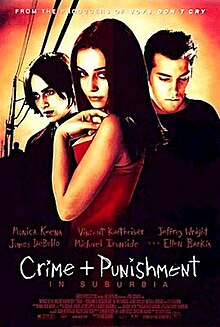fiction.wikisort.org - Movie
Crime and Punishment in Suburbia (stylized as Crime + Punishment in Suburbia or simply Crime + Punishment) is a 2000 film directed by Rob Schmidt and starring Monica Keena, Ellen Barkin, Michael Ironside, James DeBello and Vincent Kartheiser. The film is a contemporary fable loosely based on Fyodor Dostoyevsky's 1866 novel Crime and Punishment.
| Crime and Punishment in Suburbia | |
|---|---|
 Promotional movie poster | |
| Directed by | Rob Schmidt |
| Written by | Larry Gross |
| Produced by | Christine Vachon Pamela Koffler Larry Gross |
| Starring | Monica Keena Ellen Barkin Michael Ironside Vincent Kartheiser Conchata Ferrell |
| Cinematography | Bobby Bukowski |
| Edited by | Gabriel Wrye |
| Music by | Michael Brook |
Production companies | United Artists G2 Films Killer Films |
| Distributed by | MGM Distribution Co. |
Release date |
|
Running time | 100 minutes |
| Country | United States |
| Language | English |
Plot
Roseanne is outwardly a perfect and popular teen, but she suffers from a dysfunctional home life. Her mother begins an affair with Chris, a local man, and leaves her to live alone with her alcoholic stepfather Fred. One night during an alcohol-fueled rage, Fred rapes Roseanne. Traumatized, she decides to take things into her own hands. With the assistance of her devoted and clueless boyfriend Jimmy, she murders her stepfather in retribution. Afterwards, Roseanne's conscience quickly begins to unravel.
The story is narrated by one of Roseanne's classmates, Vincent, a boy who is as concerned with Roseanne's well-being as he is obsessed with her. As the plot develops, he forges a relationship with her, consoling her and giving her advice while trying to point her toward redemption. In the end it becomes possible that he will be her only salvation.
Cast
- Monica Keena as Roseanne Skolnick
- Ellen Barkin as Maggie Skolnick
- Michael Ironside as Fred Skolnick
- Vincent Kartheiser as Vincent
- James DeBello as Jimmy
- Jeffrey Wright as Chris
- Conchata Ferrell as Bella
- Marshall Teague as Coach
- Nicki Aycox as Cecil
- Bonnie Somerville as Stuck Up Girl
- Lucinda Jenney as Vincent's Mom
- Blake Shields as Moznick (as Blake C. Shields)
- Tommy Bush as Chief Judson
- Brad Greenquist as Calvin Berry
- Jim Reid Boyce as Mr.Dwyer
Production
Rob Schmidt said the film is a very loose adaptation of Fyodor Dostoevsky's novel Crime and Punishment. "The main character kills a terrible person, conceals the crime, is consumed by it, suffers secretly, confesses and in a spiritual way is reborn. It’s just that it takes place in a California high school instead of Siberia," he said.[1] Larry Gross had first written the script in the early 1990s, but it languished on a shelf until a run of high school films became popular in the last half of the decade.[1] The film's original title was Crime and Punishment in High School, but this was changed after the Columbine High massacre happened in 1999.[1]
Critical reception
On review aggregator Rotten Tomatoes, Crime and Punishment in Suburbia has an approval rating of 21% based on 29 reviews. The critics' consensus reads, "Despite the beautiful visuals, Crime and Punishment is too somber and pretentious. Also, the acting is of mixed quality."[2]
Roger Ebert awarded the film three stars and wrote, "Crime and Punishment in Suburbia is no doubt 'flawed'--that favorite moviecrit word--and it suffers from being released a year after the similar 'American Beauty,' even though it was made earlier. But it is the kind of movie that lives and breathes; I forgive its shortcomings because it strives, and because it contains excellent things."[3]
Time Out said director Rob Schmidt draws out "assured performances from Keena's good-girl-gone-bad and Kartheiser's black-clad loner", but concluded the film is a "rare disappointment from maverick indie producer Christine Vachon" and "this story of festering psychosis beneath the placid surface of everyday US suburbia looks [too] familiar."[4]
Awards
The film was nominated for the Grand Jury Prize for Dramatic Feature at the 2000 Sundance Film Festival.[5]
References
- "A Young Director Tells a Veteran How He Did It". Los Angeles Times. September 15, 2000. Retrieved 9 October 2022.
- "Crime and Punishment in Suburbia". Rotten Tomatoes. Retrieved October 9, 2022.
- Ebert, Roger (September 22, 2000). "Crime and Punishment in Suburbia". RogerEbert.com. Retrieved October 9, 2022.
- "Crime + Punishment in Suburbia". Time Out. Retrieved October 9, 2022.
- "Sundance films in competition". CNN. January 21, 2000. Retrieved 2022-10-09.
External links
- Crime and Punishment in Suburbia at IMDb
- Crime and Punishment in Suburbia at AllMovie
- Crime and Punishment in Suburbia at Box Office Mojo
- Crime and Punishment in Suburbia at Rotten Tomatoes
На других языках
- [en] Crime and Punishment in Suburbia
[it] Delitto + castigo a Suburbia
Delitto + castigo a Suburbia (Crime + Punishment in Suburbia) è un film del 2000 diretto da Rob Schmidt.Другой контент может иметь иную лицензию. Перед использованием материалов сайта WikiSort.org внимательно изучите правила лицензирования конкретных элементов наполнения сайта.
WikiSort.org - проект по пересортировке и дополнению контента Википедии